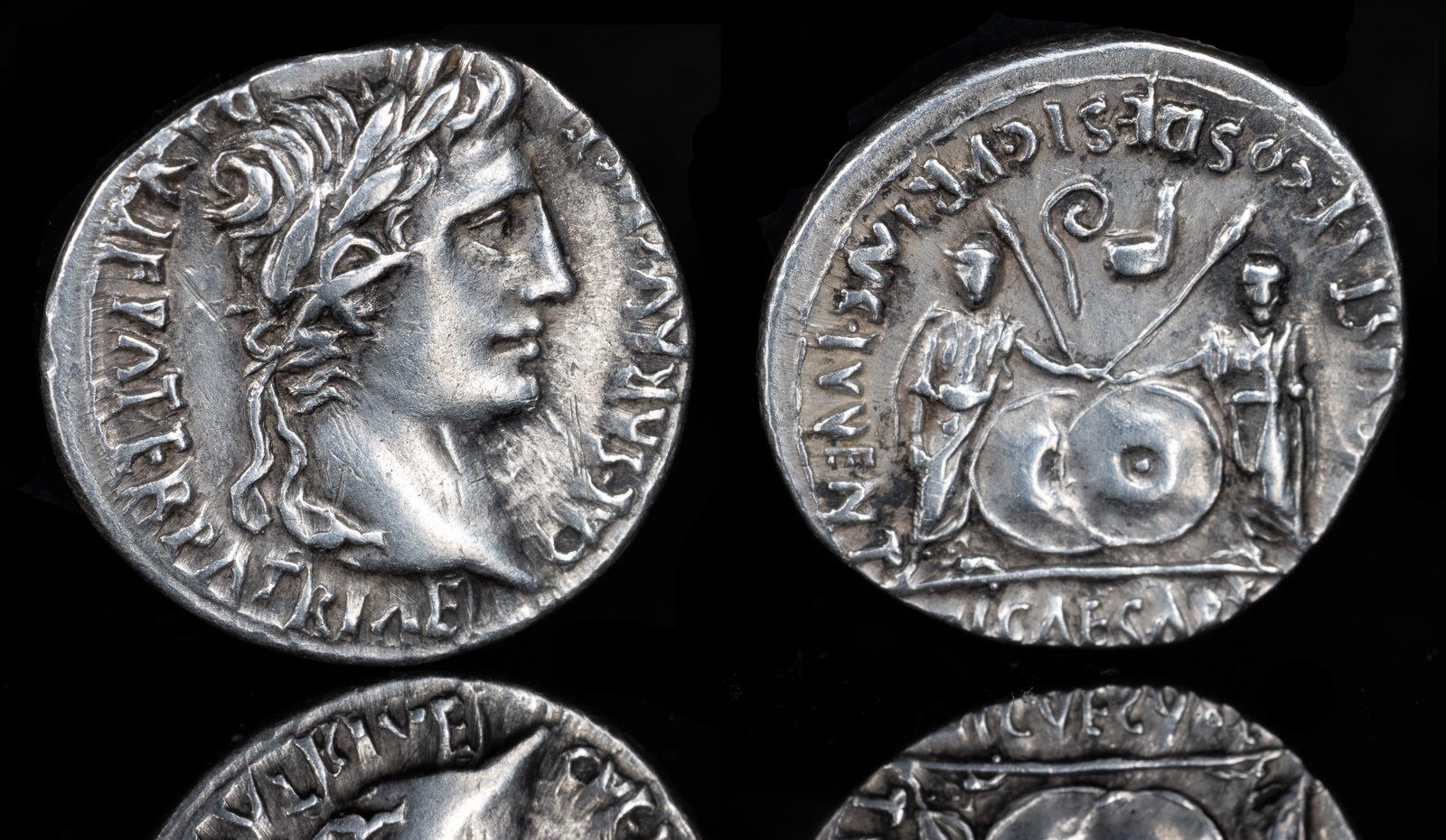
AUGUSTUS (27 BCE-14 CE)
Denarius. Lugdunum.
19mm 3.77g
Obv: CAESAR AVGVSTVS DIVI F PATER PATRIAE. Laureate head right.
Rev: AVGVSTI F COS DESIG PRINC IVVENT / C L CAESARES.
Caius and Lucius Caesar standing facing; two shields, two sceptres; lituus and simpulum above.
RIC² 209
September 23
Gaius Octavius Thurinus (later Augustus) is born in Rome. He is the son of Gaius Octavius, a senator and governor, and Atia, the niece of Julius Caesar.
Death of Augustus’ father.
Gaius Octavius’s father dies. His mother, Atia, marries Lucius Marcius Philippus, a former consul.
Lucius Marcius Philippus, the stepfather of Augustus, is made a consul.
Death of Augustus’ grandmother, Julia, who raised him. She was the sister of Julius Caesar.
Octavius joins Julius Caesar in Hispania (Spain) during Caesar’s campaign against the sons of Pompey.
March 15
Julius Caesar is assassinated. In his will, Caesar adopts Octavius as his son and heir, naming him Gaius Julius Caesar Octavianus (Octavian).
Octavian, Mark Antony, and Marcus Lepidus form the Second Triumvirate, a political alliance aimed at avenging Caesar’s assassination.
October 23
Octavian and Mark Antony defeat Brutus and Cassius at the Battle of Philippi in Greece, effectively ending the resistance of Caesar’s assassins.
Octavian marries Scribonia, who gives birth to his only biological child, Julia the Elder.
Livia and her husband flee from Octavius and join Sextus Pompey in Sicily.
January 17
Octavian divorces Scribonia and marries Livia Drusilla, despite her being pregnant with her previous husband’s child.
September 3
Octavian defeats Sextus Pompey, the son of Pompey the Great, in the naval Battle of Naulochos, solidifying his control over Rome’s grain supply.
Augustus donates a public statue to Livia. Ovid later mentions this as a great place to pick up women.
The Second Triumvirate ends. Octavian begins a propaganda campaign against Mark Antony, accusing him of betraying Rome by allying with Cleopatra, Queen of Egypt.
Augustus removes Strato, tyrant of Amisos.
Augustus gives Kydonia its freedom due to their assistance.
Malichos I has a bitter rivalry with Kleopatra VII, resulting in his failing to show up for the Battle of Actium, a victory for Octavian.
September 2
Octavian’s forces defeat Antony and Cleopatra at the Battle of Actium.
October
Octavian (later Augustus) enters Alexandria and annexes Egypt into the Roman Empire. Cleopatra VII commits suicide, ending the Ptolemaic Dynasty.
Straton’s Tower is given to Herod I, who renamed it to Caesarea Maritima in honor of Augustus.
Augustus makes Dyrrhachion a colony for veterans of the Battle of Actium.
Octavian removes Philopator I, the son of Tarkondimotos, from the throne of Cilicia.
Octavian resettles Potidaia and renames it Colonia Iulia Augusta Cassandrensis.
August 10
Antony and Cleopatra commit suicide. Octavian conquers Egypt, making it a Roman province.
Augustus completes the rebuilding of Carthage, which becomes the center of Africa Proconsularis, a key province of the Roman Empire.
Corinth becomes the capital of the Roman province of Achaia under Augustus.
Philippi is renamed to Colonia Iulia Philippensis by Augustus.
January 16
Octavian is granted the title Augustus by the Roman Senate, marking the end of the Roman Republic and the beginning of the Roman Empire. He becomes the first Roman Emperor.
Tralleis is severely damaged by an earthquake. Augustus provides funds for the reconstruction, so Tralleis renames itself to Caesarea.
Augustus falls seriously ill and nearly dies. He arranges for his political succession by granting more power to his trusted lieutenant, Agrippa.
Death of Marcellus, nephew to Augustus. Livia is suspected of poisoning him.
Augustus visits Ilion.
Artaxias II is removed as king of Armenia by Augustus, upon receiving a letter from his unhappy subjects. Tigranes III is installed as king.
The kingdom of Cilicia is restored by Augustus to Tarkondimotos II.
Augustus settles veterans of his conflict with Marc Antony and Kleopatra in Aesernia.
July 4
Ara Pacis Augustae constructed in Rome to honor the return of Augustus.
Roman Italy established by Augustus with the name ‘Italia’.
Augustus is given the title Pater Patriae (Father of the Country) by the Senate.
Death of Lucius, grandson to Augustus and an heir to the Roman Empire with his brother Gaius.
Death of Gaius, grandson to Augustus the sole remaining heir to the Roman Empire.
June 26
After the death of Gaius Caesar, Augustus considers making Germanicus his heir. Livia persuades him to choose Tiberius, and Augustus does so on condition that Tiberius adopt Germanicus.
September 8
Three Roman legions are destroyed under Varus in the Battle of the Teutoburg Forest, causing Augustus severe angst.
Augustus appoints Germanicus as commander of forces in the Rhein.
Augustus adopts his stepson, Tiberius, as his heir, ensuring a smooth transition of power.
August 19
Augustus dies in Nola, Italy, at the age of 75. He is succeeded by Tiberius.